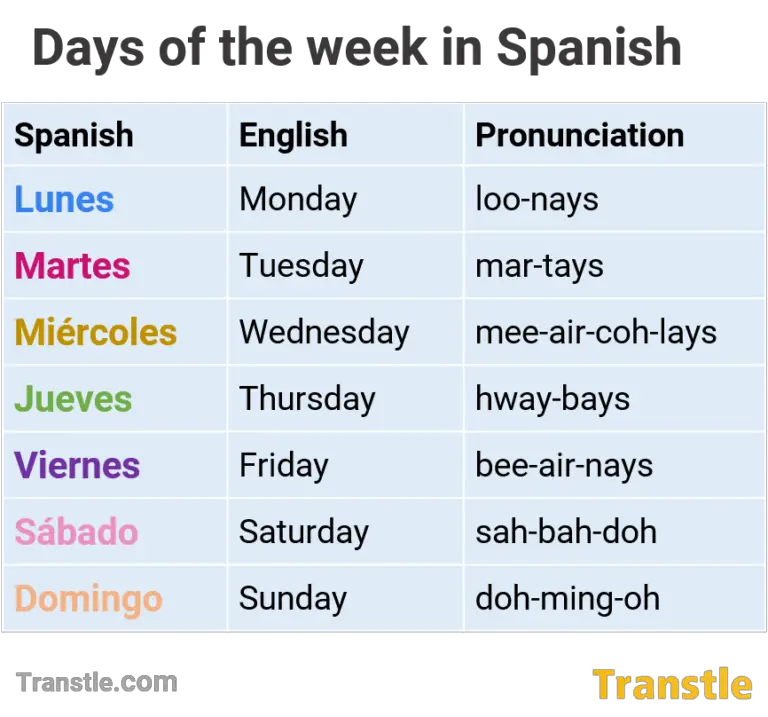Days Of The Week In Spanish with examples and pronunciation

In addition to learning the vocabulary, it is important to understand the grammatical rules associated with these days, such as the correct use of articles and prepositions.
See also: Months of the year in Spanish.
The Seven Days of the Week in Spanish
| Spanish | English | Pronunciation |
|---|---|---|
| Lunes | Monday | loo-nays |
| Martes | Tuesday | mar-tays |
| Miércoles | Wednesday | mee-air-coh-lays |
| Jueves | Thursday | hway-bays |
| Viernes | Friday | bee-air-nays |
| Sábado | Saturday | sah-bah-doh |
| Domingo | Sunday | doh-ming-oh |
Useful Related Vocabulary
| Spanish | English | Gender |
|---|---|---|
| Día | Day | (m) |
| Semana | Week | (f) |
| Días de la semana | Days of the week | (m) |
| Fecha | Date | (f) |
Key Grammar Rules for Days of the Week
1. Always write in lowercase: In Spanish, the days of the week are generally written using lowercase letters. Capitalization is only applied when the day is the very first word of a sentence. For more details, see this guide to capitalization in Spanish.
2. Expressing the current day: To express the current day, simply use the phrase “Es” (meaning “it’s” or “it is”) followed directly by the day of the week.
3. Indicating events with “El”: When an event occurs on a specific day, it is mandatory to use the definite article “El”. Unlike English, the preposition “on” is not used. Learn more about definite articles here.
Common Time Expressions
| Spanish | English | Gender/Notes |
|---|---|---|
| Pasado mañana | The day after tomorrow | - |
| Antes de ayer | The day before yesterday | - |
| El día siguiente | The next day | - |
| El día anterior | The last day | - |
| El último día | The last day | - |
| Cumpleaños | Birthday | (m) |
| Día festivo | Public holiday | - |
| Mañana | Morning | - |
| Mediodía | Noon | (m) |
| Tarde | Afternoon | (f) |
| Noche | Night | (f) |
| Medianoche | Midnight | (f) |
Example Sentences Using the Days of the Week
Exercises
Now practice the days of the week with the following interactive exercises:

Time's up
Read next
Colors in Spanish: 50+ Shades List, Grammar Rules & Tips
Colors in Spanish, complete list of colors in Spanish with pictures, sentences, and pronunciation. Learn them today!
How to Write an Essay: Step by Step Guide & Examples
Essays are very useful and practical learning and expression tools. Learn how to write the introduction, body, conclusion of an essay & how to organize it.
Months of the Year in Spanish: List & Pronunciation
The months of the year in Spanish with pronunciation, full list, grammar rules, sentences and examples. Learn them today!